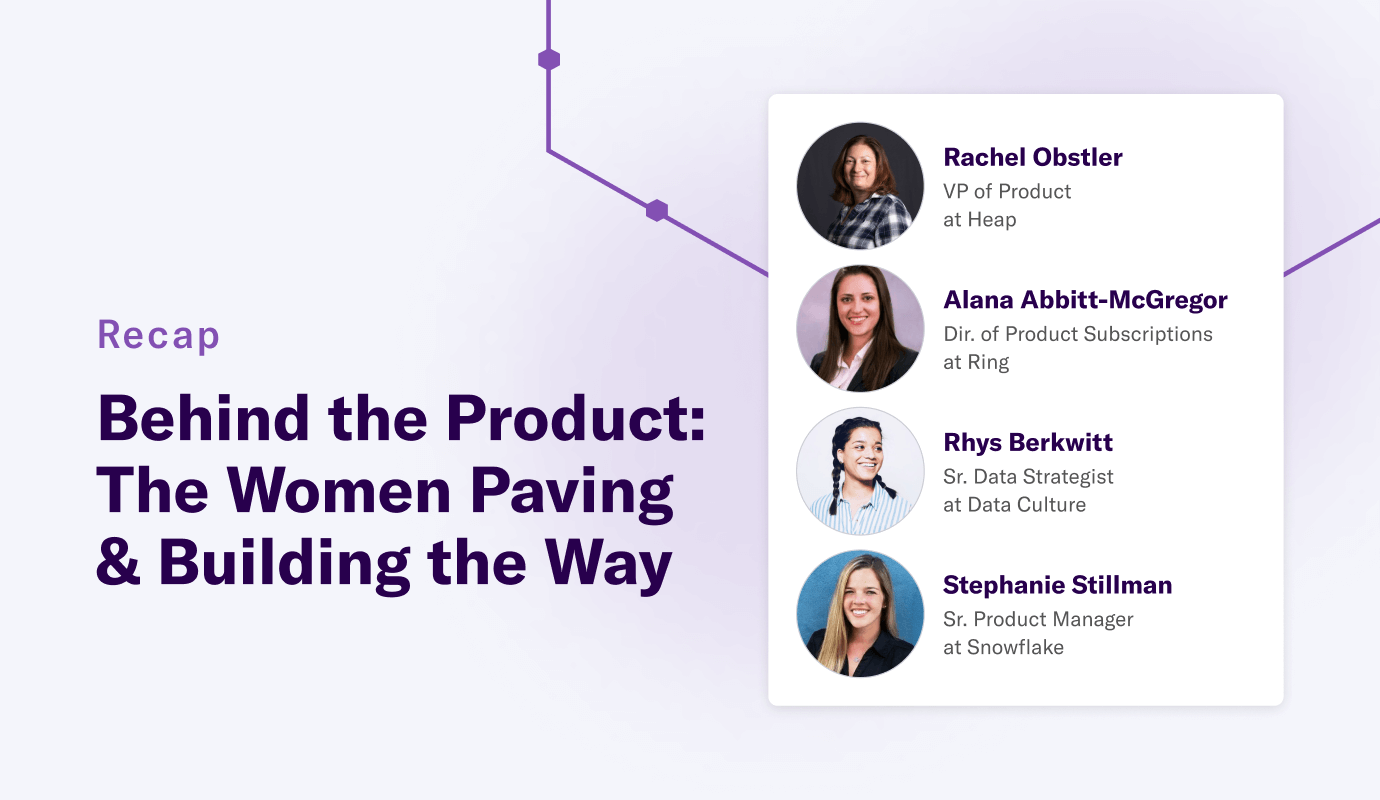Advice From the Women Behind the Product
At Heap, we’ve long believed in creating diverse teams that foster diverse thinking. For International Women’s day, I hosted a panel of brilliant women product leaders from companies like Ring, Snowflake, and Data Culture. We talked about our paths to leadership, the importance of data and analytics to our success, and advice to women on advancing their careers and changing jobs.
Here are some of the highlights from our conversation.
What are some of the challenges you’ve faced in your career?
Stephanie Stillman, Sr. Product Manager at Snowflake: I found breaking into product management was a challenge, because there wasn’t a clear path for how to get there. Companies want to hire PMs with experience in product management. So without that...how do you break into the role? What I did was find examples of work I’d done in the past that proved I had the skills, even if I hadn't had the PM title. So my advice to those looking for their first PM role is to tailor experience on your resume to highlight qualifications that match PM expectations. And don’t give up! Breaking into product is hard. I had a lot of rejections, but it only takes one yes!
If you could do it over, what would you do differently?
Alana Abbitt-McGregor, Director of Product Subscriptions at Ring: I’d be more intentional about which moves were a good fit for me and my career. I also would have spoken up more, advocating for my experience and sharing my wins. When I look back, I realize that there were gaps in others’ understanding of my value.
Rhys Berkwitt, Sr. Data Strategist at Data Culture: I would be more intentional in reaching out and creating relationships. I’d open up more conversations and relationships with people outside of my immediate sphere within the organization and the industry. I’ve learned that developing those connections is not just about getting to the next step—those relationships help you become more introspective about where you are.
What are some tips for advancing your career?
Stephanie: The most important thing is to advocate for yourself, because no one cares as much about your career as you do. Ask for honest feedback about what you need to do to move to the next level. Keep logs of your wins to show that you might already be performing at the next level. It can be uncomfortable if it feels like bragging, but you have to be your own biggest cheerleader. The second thing is, while advocating for yourself, don’t lose sight of doing a great job. Your first focus should be building a great product and doing work that you’re proud of, so that when it comes to a promotion, you’ll have a lot of others advocating for you.
What is the value of mentorship, and how do you find mentors?
Rhys: Mentorship is key in providing you with unique and diverse perspectives. When looking for mentors, seek out people that are both similar and different from you, not just those on the paths you want to pursue. Lean on your network, good managers, colleagues, and friends. Reach out to people you meet at events or company all-hands. Any time you encounter people that inspire you, start a conversation. You don’t know where it can lead.
How do you know when it’s time to move on in your career?
Alana: The quote that I’ve followed is, “When you think you’ve peaked, find a new mountain.” Ambitious people can get too focused on getting up their current mountain instead of taking a step back to make sure that it's still the one they want to climb. My advice is to take a step back and check in with yourself frequently. And remember that it’s not always about career progression. Personal fulfillment is important, too.
What advice would you give to someone transitioning to a new industry?
Stephanie: If you don't have experience in the new industry, focus on the role. Highlight the skills that you have that fit the role and share your enthusiasm to learn about the industry. When I joined Snowflake, I knew nothing about the cloud, but I made it clear I had cross-collaborative skills and was willing to get my hands dirty and do whatever it took. Sometimes subject-matter expertise is mandatory, but there are a lot of industries where a fresh perspective is valuable. “Maybe we can improve things by doing them differently.”
What do you think will help pave the path for women in tech?
Stephanie: It’s important to not only focus on hiring more women but also to prioritize promoting women into leadership positions. Make an effort to nurture women’s careers. In my own career, it was critical to see strong women in very technical leadership positions and know that it was possible for me. Although the hiring process may take longer, it’s the only way to sustain women’s leadership in technology.
Rhys: Make sure that you are growing people once they are in the company. Set up structured programs and resources for both upward and lateral movement within the organization. Also create outreach and awareness programs to work with youth who may not be aware of the opportunities in the tech industry.
What parting advice do you have for women working in product?
Rhys: Don’t shy away from speaking with people that you look up to or are interested in learning from.
Stephanie: Constantly seek out roles or projects that make you uncomfortable. Find the things that scare you; they will help you prove to yourself that you really can do anything you want in the future.
Alana: Remember to advocate for yourself and to lift as you climb. No matter where you are in your career, you can be supporting others.
You can view our whole conversation with audience Q&A here. And if you’re a woman looking for a great job in tech, come join us at Heap!

